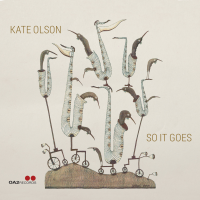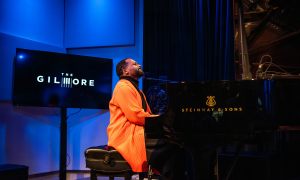During the epilogue of “Louis," an energetic but muddled new silent film that played at the Apollo Theater on Monday night, a wide-eyed Louis Armstrong arrives at the Colored Waif's Home for Boys, confronted for the first time with a functional New Orleans institution, and the prospect of discipline. He's being lectured, sternly but kindly, by the home's band director, Prof. Peter Davis. The film is nearing a close, in other words, but Armstrong's story as we know it is poised to begin.
“Louis," directed by Dan Pritzker, is a picaresque set against Armstrong's boyhood, in a streetscape of prostitutes and scoundrels. With a pace and cinematic language openly inspired by Charlie Chaplin, it's as much a riff on silent movies as it is a coming-of-age tale with a whiff of political farce. But the main draw at the Apollo, as in the few other places around the country where the movie has screened, was a live accompaniment by Wynton Marsalis, whose repurposed music makes up much of the soundtrack.
Strictly on its musical merits, this made for excellent entertainment. Mr. Marsalis was in his wheelhouse, playing the trumpet with a 10-piece band whose members were mostly drafted from the ranks of his Jazz at Lincoln Center Orchestra.
“Louis," directed by Dan Pritzker, is a picaresque set against Armstrong's boyhood, in a streetscape of prostitutes and scoundrels. With a pace and cinematic language openly inspired by Charlie Chaplin, it's as much a riff on silent movies as it is a coming-of-age tale with a whiff of political farce. But the main draw at the Apollo, as in the few other places around the country where the movie has screened, was a live accompaniment by Wynton Marsalis, whose repurposed music makes up much of the soundtrack.
Strictly on its musical merits, this made for excellent entertainment. Mr. Marsalis was in his wheelhouse, playing the trumpet with a 10-piece band whose members were mostly drafted from the ranks of his Jazz at Lincoln Center Orchestra.


























